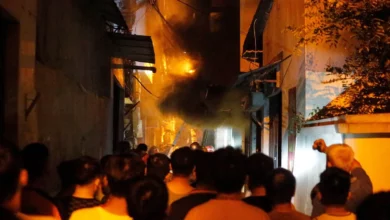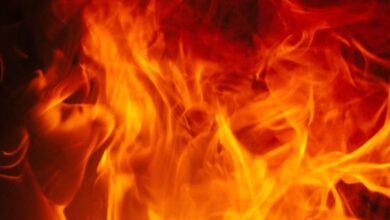Baghdad–A fierce blaze at a hotel without fire escapes sent some desperate guests plunging to their deaths in a northern Iraqi oil boomtown, killing 28 people.
Half of those killed were foreigners, a reflection of the thousands of migrants who have flooded the Kurdish region in northern Iraq in recent years in search of economic opportunities. Kurdistan, which has been spared the brunt of violence in Iraq, has prospered even as the rest of the country remains mired in sectarian bloodshed and political woes that have slowed investment.
The fire began late Thursday night in the city of Sulaimaniyah and lasted well into Friday morning as firefighters battled the deadly blaze in the five-story Soma Hotel for nearly five hours.
Witnesses described a chaotic scene in which smoke filled the hallways and billowed out of the windows, forcing some hotel guests to jump from the upper floors in a desperate attempt to avoid the flames.
One man who was visiting friends at the hotel, Mariwan Asaad, described seeing flames and smoke filling the corridors on the third floor, forcing him to stumble blindly in search of a way out. Through the open doorway of one room he saw a man lying on the floor, dead from smoke inhalation.
“I entered the room and threw myself from the window. I broke my legs. The pain was so great that I lost consciousness. I found myself in the hospital,” he said, speaking just before going into the operating room for surgery.
The owner of another hotel next door said the fire reached his building but his hotel workers managed to douse the flames.
“Thick smoke was going out from all the hotel windows. I saw at least three people jumping from the fifth story,” Hawri Hassan said.
Most of the victims died from smoke inhalation, and the lack of fire escapes contributed to the high death toll, said the head of the city’s fire department, Brig. Yadgar Mohammed Mustafa.
Kurdish Prime Minister Barham Saleh said 28 people died and 22 were injured, in a statement released by the Kurdistan Regional Government. Fourteen of the dead were foreigners, the statement said.
He said the government was working with embassies to notify the next of kin. The prime minister said he had ordered a review of all fire safety measures in public buildings in the city and the region.
“I have ordered an immediate investigation into the accident to establish the causes of the fire and assess the emergency procedures that followed. We will spare no effort in making sure such tragedies do not occur in the future,” he said.
The dead included people from Cambodia, Bangladesh, Canada, Australia, Ecuador, South Africa, Britain, Lebanon, Venezuela, Sri Lanka and one person who was believed to be a foreigner but did not have identification, the Kurdish government said.
The chief of police, Brig. Gen. Najim-al-Din Qadir, said the blaze was sparked by an electrical short. The top health official in Sulaimaniyah, Rekwt Mohammed, said one of the dead was a pregnant woman.
Some of those killed were working for foreign oil companies, according to the police chief.
A number of such oil companies operate in the Kurdish north, which sits atop about 40 percent of Iraq’s total 115 billion barrels of proven crude oil reserves.
A Dubai-based company, Terraseis, which conducts geological surveys for the oil industry, said in a statement late Friday that eight of its employees were killed in the fire.
“This is a tragic situation and our hearts go out to all those who are impacted,” said the company.
Despite Iraq’s instability and struggling economy, the country — especially the three provinces that make up the Kurdish region — is still a destination for migrant workers, mostly from Asia and Africa, said Jean-Philippe Chauzy, a spokesman for the Geneva-based International Organization for Migration.
While the rest of Iraq has been plagued by violence since the 2003 US-led invasion, the Kurdish region has enjoyed relative stability, benefitting from a construction boom that has seen investors throw up houses, hotels and office buildings.
The growth and stability in the region have also spurred a growing number of airlines to fly into the Kurdish region, some from as far away as Austria.
Waleed Mohammed, marketing manager in Sulamaniyah for Lafarge SA, the world’s largest cement maker, said some Kurdish businessmen who had worked in Europe or the Gulf states were bringing in workers from countries such as India or Bangladesh, in part because they were better trained than Kurdish workers.
However, the lack of fire escapes at the building raises questions about the Kurdish building boom and whether corners are being cut in pursuit of economic growth.
“There is too much building going on in Sulamaniyah without enough government oversight,” said one builder in the city, Arass Karim Wali. “Most of them have no safety regulations, especially in the hotels and the markets.”




